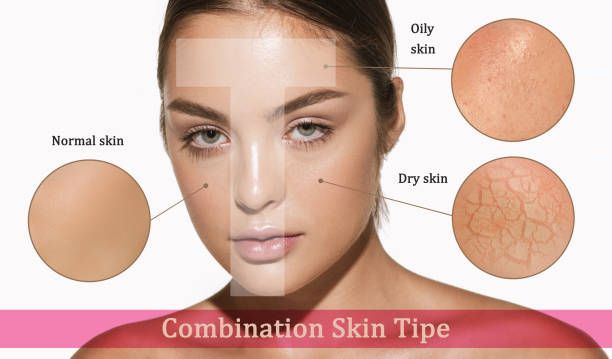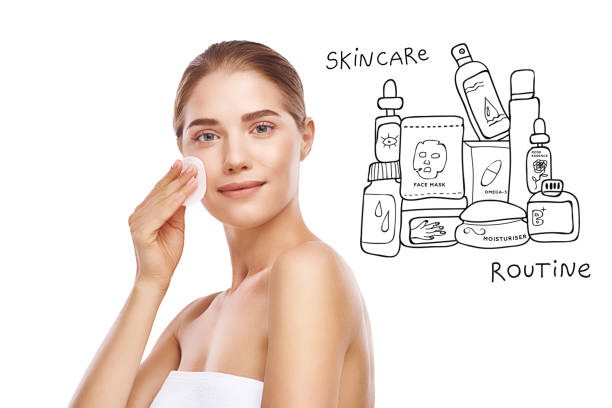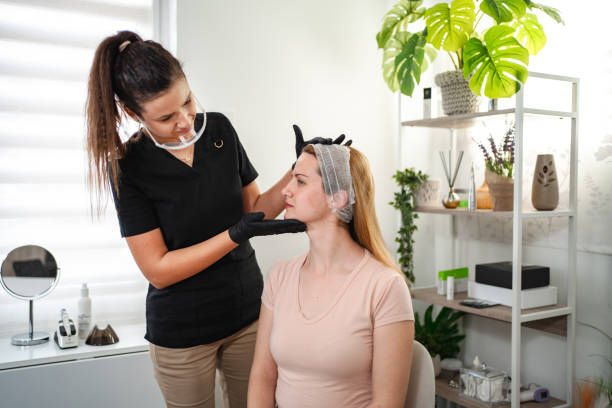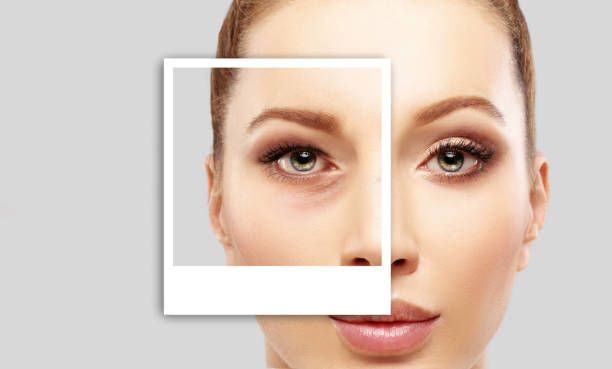I. Introduction to Skin Type
Have you ever wondered why a skincare product that works wonders for a friend does nothing for you or, worse, irritates your skin? The answer often lies in understanding your unique skin type. Every person’s skin is distinctive, with its own set of characteristics and needs. By understanding your skin type, you can tailor your skincare routine to give your skin exactly what it needs, promoting healthier and more radiant skin.

In this comprehensive guide, we’ll delve deep into the world of skin types. We’ll start by defining what skin types are and the influence of genetics and environmental factors on them. Following this, we’ll debunk common misconceptions about skin types, ensuring you’re armed with accurate information. Next, we’ll provide detailed insights into each skin type—normal, dry, oily, combination, and sensitive—along with tailored care tips. Finally, we’ll explore the science behind skin types, including the role of sebum, the importance of pH levels, and the impact of environmental factors.
II. The Basics of Skin Type

1- Defining Skin Type
Skin types are broadly categorized based on how much sebum your skin produces. Sebum is an oily substance produced by sebaceous glands that helps to keep our skin hydrated and protected. However, the amount and composition of sebum can vary significantly from person to person, influenced by factors such as genetics and environmental conditions.
Genetics plays a pivotal role in determining your skin type. They dictate your skin’s texture, sensitivity level, and how it ages. On the other hand, environmental factors like climate, pollution, and even your lifestyle choices can affect your skin type over time. For instance, someone might genetically have normal skin but develop dryness or sensitivity due to living in a harsh, polluted environment.
2- Common Misconceptions About Skin Type
There are numerous myths surrounding skin types. A common misconception is that oily skin doesn’t need moisturization. In reality, oily skin can be dehydrated and may benefit from lightweight, non-comedogenic moisturizers. Another myth is that dry skin solely results from external factors like weather. While external factors do play a role, dry skin can also result from genetic factors or an underlying health condition.
Identifying Different Skin Types

1- Normal Skin
Characteristics: Normal skin is well-balanced, neither too oily nor too dry. It has a regular texture, no severe sensitivities, and barely visible pores.
Care Tips: Maintain this balance by using gentle cleansers and hydrating with light moisturizers. To protect from UV damage, it’s crucial to use sunscreen regularly.
2- Dry Skin
Characteristics: Dry skin produces less sebum than normal skin. It often feels tight and can show signs of flaking and rough patches.
Care Tips: Hydration is key. Use rich, emollient moisturizers and avoid harsh, drying cleansers. Incorporating hydrating serums and regular gentle exfoliation can help.
3- Oily Skin
Characteristics: Oily skin is characterized by excess sebum production, leading to a glossy appearance and enlarged pores.
Care Tips: Opt for oil-free, non-comedogenic products. Gentle exfoliation can help manage excess sebum. While it may seem counterintuitive, moisturizing is still essential to maintain skin balance.
4- Combination Skin
Characteristics: Combination skin features two or more different skin types on the face. Typically, the forehead, nose, and chin (T-zone) are oily, while the cheeks are normal or dry.
Care Tips: Use targeted treatments—lighter products for oily areas and more affluent products for dry areas. Balancing the skin’s needs is critical.
5- Sensitive Skin
Characteristics: Sensitive skin is prone to redness, itching, and irritation. It may react to certain skincare products or environmental factors.
Care Tips: Look for products specifically formulated for sensitive skin, free of irritants like fragrances and alcohol. Before trying out any new products, it’s always a good idea to perform a patch test. This will help you determine whether or not the product is suitable for your skin and prevent any adverse reactions.
The Science Behind Skin Type

1- The Role of Sebum
Sebum, while essential for skin health, can create challenges when produced in excess or insufficient quantities. Excess sebum in oily skin can lead to clogged pores and acne. Conversely, inadequate sebum production in dry skin can cause a compromised skin barrier, leading to irritation and sensitivity.
2- pH Levels and Skin Health
The pH level of your skin, which determines its acidity or alkalinity, is crucial for skin health. A balanced pH level helps to protect the skin from harmful bacteria and environmental stressors. Disruptions in pH balance can lead to skin problems like dryness, eczema, or acne.
3- Environmental Factors
External factors such as sun exposure, climate, and pollution can significantly impact skin. Sun damage, for instance, Excessive exposure to UV radiation, can cause premature aging and elevate the risk of developing skin cancer and making sunscreen an essential part of a skincare routine regardless of skin type. Pollution can also lead to oxidative stress, causing skin dullness and irritation.
Skincare Routines for Each Skin Type

1- Skincare for Normal Skin
Normal skin, characterized by its balance, benefits from a simple yet effective routine. A gentle cleanser and a lightweight moisturizer are essential. Regular use of a broad-spectrum sunscreen will help maintain skin health. Occasional exfoliation can help keep the skin smooth and radiant.
2- Skincare for Dry Skin
Dry skin requires a focus on hydration. Look for creamy, hydrating cleansers and rich moisturizers with ingredients like hyaluronic acid and glycerin. Avoid using products with high alcohol content as they can further dehydrate the skin. Weekly hydrating masks provide an extra moisture boost.
3- Skincare for Oily Skin
For oily skin, it’s crucial to balance sebum production without stripping the skin. Use a gentle, foaming cleanser and opt for water-based or gel-based moisturizers. Salicylic acid can be beneficial for controlling excess oil and preventing acne. Be wary of over-exfoliating, as this can irritate the skin and increase oil production.
4- Skincare for Combination Skin
Combination skin requires a versatile approach. Use a mild cleanser that doesn’t strip the skin’s natural oils. A lightweight moisturizer works best, and in some cases, you may need to use a more hydrating product on dry areas. Blotting papers can help manage shine in oily zones throughout the day.
5- Skincare for Sensitive Skin
Sensitive skin needs gentle, fragrance-free products. Avoid harsh ingredients like alcohol and sulfates. Soothing ingredients such as aloe vera and chamomile possess properties that can effectively calm and alleviate irritation. Always introduce new products slowly to monitor your skin’s reaction.
6- Universal Skincare Tips
Certain skin care practices benefit everyone, regardless of skin type. Regular cleansing, moisturizing, and sun protection are fundamental. Pay attention to how your skin reacts to different products and adjust your routine accordingly.
Professional Insights and Advice

1- Dermatologist Recommendations
Dermatologists emphasize the importance of understanding your skin’s unique needs. They often recommend patch-testing new products and advise against following trends that don’t align with your skin type. Regular check-ups can help address any skin concerns and update skincare routines as needed.
2- Case Studies and Success Stories
Real-life success stories often highlight the effectiveness of personalized skincare routines. Case studies involving individuals with specific skin concerns demonstrate the transformative power of a targeted skincare approach.
Beyond Skin Type – Holistic Skincare

1- The Importance of Diet and Hydration
A diet rich in antioxidants, vitamins, and minerals while staying hydrated can significantly improve skin health and elasticity.
2- Lifestyle Factors Affecting Skin Health
Factors like stress, sleep quality, and exercise play a vital role in skin health. Making healthy lifestyle choices, such as managing stress effectively, getting sufficient sleep, and engaging in regular exercise, can greatly enhance the appearance and overall health of your skin.
3- Mental Health and Its Impact on Skin
Mental health directly affects skin health. Stress can exacerbate skin issues like acne and eczema. It’s essential to adopt practices that support mental well-being as part of a holistic approach to skincare.
Conclusion
In conclusion, understanding your skin type is the first step towards a healthy and effective skincare routine. Remember, skin care is deeply personal, and what works for one person may not work for another. We encourage you to listen to your skin and adapt as needed, seeking professional guidance when necessary.
FAQ About Skin Type
1- What is the best way to determine my skin type?
Observe how your skin behaves without products over a day. Look for oiliness, dryness, or sensitivity signs.
2- Can my skin type change as time goes by?
Yes, skin types can change due to factors like age, climate, and hormonal changes.
3- Is it necessary to use sunscreen if I have oily skin?
Absolutely. Sunscreen is vital for all skin types to protect against UV damage.
4- How often should I exfoliate sensitive skin?
Limit exfoliation to once a week, using a gentle exfoliator, and observe how your skin reacts.
5- Can diet really affect my skin?
Yes, a healthy diet can significantly impact your skin’s health and appearance.
6- What are non-comedogenic products?
These are products formulated not to clog pores, ideal for oily and acne-prone skin.
7- How can I tell if a skincare product isn’t right for me?
Signs like redness, itching, or breakouts after use may indicate the product isn’t suitable for your skin.
8- Do natural or organic skincare products work better?
This depends on your skin type and preference. Natural doesn’t always mean better or safer.
9- Is it necessary to see a dermatologist for routine skincare?
While not always necessary, consulting a dermatologist can provide tailored advice for your skin needs.
10- How can I reduce the appearance of large pores?
Regular cleansing and using products that balance sebum production can help minimize pore appearance.
Read also.. Purslane: Your Skin’s New Best Friend

